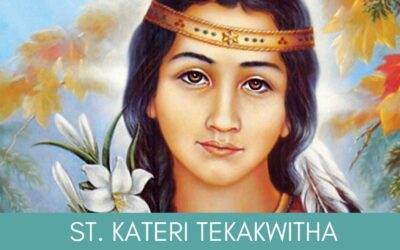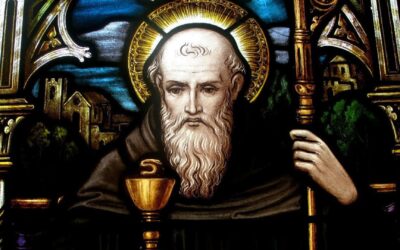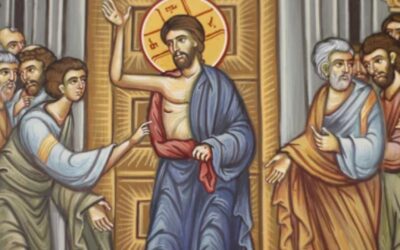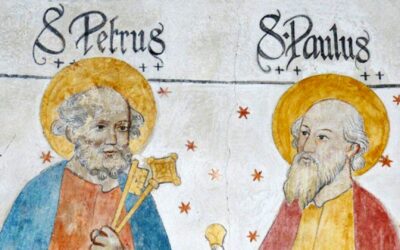Image courtesy of National Catholic Register.
A Message from Father Nathan
My dearest people who are all close to my heart
Lots of love, blessings, and prayers to you all.
Celebrating St. Augustine
This week we celebrate one of my favorite saints. I love to read, talk, and quote him and learn from him. He is one of the great intellectuals of the church.
St. Augustine, bishop of Hippo in North Africa (354 to 430 AD), was one of the great minds of the early Christian Church, a theologian whose ideas forever influenced the Roman Catholics. But Augustine did not come to Christianity by a straightforward path.
St. Augustine’s Early Life – Pagan Beginnings
At an early age, he began searching for the truth in the popular pagan philosophies and cults of his day. His young life was also scarred by immorality. The story of his conversion told in his book Confessions, is one of the greatest Christian testimonies of all time. Augustine was born in 354 in Thagaste, in the North African province of Numidia, now Algeria.
His father, Patricius, was a pagan who worked and saved so his son could receive a good education, Monica, his mother, was a committed Christian who prayed constantly for her son. From a basic education in his home city, Augustine progressed to studying classical literature, then went to Carthage for training in rhetoric, sponsored by a benefactor named Romanianus.
The bad company led to bad behavior. Augustine took a mistress and fathered a son, Adeodatus who died in 390 A.D. Led by his hunger for wisdom, Augustine became a Manichean. Manicheism was founded by the Persian philosopher Mani (216 to 274 A.D.) and taught dualism, a rigid division between good and evil. Like Gnosticism, this religion claimed secret knowledge is the route to salvation. It attempted to combine the teachings of Buddha, Zoroaster, and Jesus Christ.
St. Augustine’s Mother Prayed
All the while, Monica had been praying for her son’s conversion. That finally happened in 387, when Ambrose, the bishop of Milan, Italy, baptized Augustine. Augustine returned to his birthplace of Thagaste, was ordained a priest, and a few years later was made bishop of the city of Hippo.
Augustine possessed a brilliant intellect yet maintained a simple life, much like a monk. He encouraged monasteries and hermits within his bishopric in Africa and always welcomed visitors who could engage in learned conversation. He functioned more as a parish priest than an aloof bishop, but throughout his life, he was always writing.
Augustine’s Two Confessions, tells the story of his sexual immorality and his mother’s unrelenting concern for his soul. He sums up his life for Christ, saying, “So I may cease to be wretched in myself and may find happiness in you.”
City of God, written near the end of Augustine’s life, was partly a defense of Christianity in the Roman Empire. The emperor Theodosius had made trinitarian Christianity the offical religion of the empire in 390. Twenty ryears later, the barbarian Visigoths, led by Alaric I, sacked Rome. Many Romans blamed Christianity, claiming that turning away from the ancient Roman gods had caused their defeat. The remainder of the City of God contrasts the earthly and heavenly cities.
God bless you all.
With lots of love and blessings,
Ever wanting to be faithful to your service,
— Fr. Sahayanathan Nathan
Set up Online Giving.
You can make a one-time donation or set up recurring gifts.
Join our Parish Family
Register in the parish, so that it’s easy to become a confirmation sponsor or Godparent.
Want to Lend a Helping Hand?
Find volunteer opportunities and share your talents.
Need a Helping Hand?
We are here to help. Request home visits, send a prayer request. For urgent needs call 954.943.3684
Past Messages from Father Nathan
From The Desk Of Father Nathan | July 28, 2024
There is power in prayer. Please pray for our parish, our parishioners and our pastor. Pray for hope and healing. Prayer works!
From The Desk Of Father Nathan | July 21, 2024
Lett us pray that we may all be IN PEACE AND HARMONY
Let us also pray for our nation.
Elections may come and go but we need peace in this nation.
Political affiliations cannot divide us and our nation. It should help unite us and provide a path to enjoy peace and harmony.
From The Desk Of Father Nathan | July 14, 2024
St. Kateri Tekakwitha. First Native American saint. Patron saint of ecology and the environment, people in exile, and Native Americans…
From The Desk Of Father Nathan | July 07, 2024
St. Benedict. Father of monasticism. Patron Saint of Europe. Protector. He is the patron saint of a wide variety of people and needs, including: against poison, agricultural workers…
From The Desk Of Father Nathan | June 30, 2024
Important Basilica – St. Peter’s Basilica in Vatican City, Basilica of St. John – Ephesus, St. Thomas Cathedral Basilica in Chennai India + the Story of St. Thomas.
From The Desk Of Father Nathan | June 23, 2024
The Solemnity of Sts. Peter and Paul, apostles. The rock on which the Church is built and the origin of our faith -the protectors and guides.






